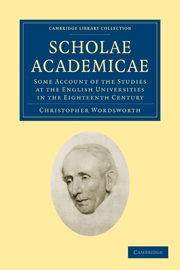 Scholae Academicae
Scholae Academicae Book contents
- Frontmatter
- PREFACE
- Contents
- CHAPTER I GENERAL INTRODUCTION
- CHAPTER II THE TRIPOS, name and thing
- CHAPTER III THE SOPHS' SCHOOLS before 1765
- CHAPTER IV ACTS AND OPPONENCIES after 1772
- CHAPTER V THE SENATE-HOUSE
- CHAPTER VI THE ADMISSION OF QUESTIONISTS. Huddling
- CHAPTER VII THE MATHEMATICKS
- CHAPTER VIII THE TRIVIAL ARTS
- CHAPTER IX HUMANITY
- CHAPTER X MORALS AND CASUISTRY
- CHAPTER XI LAW
- CHAPTER XII MODERN STUDIES
- CHAPTER XIII ORIENTAL STUDIES
- CHAPTER XIV PHYSICK
- CHAPTER XV ANATOMY
- CHAPTER XVI CHEMISTRY
- CHAPTER XVII GEOLOGY AND MINERALOGY
- CHAPTER XVIII BOTANY
- CHAPTER XIX The Degree of M.A.
- CHAPTER XX MUSICK
- CHAPTER XXI ASTRONOMY
- CHAPTER XXII CONCLUSION
- APPENDICES
- INDEX
CHAPTER VI - THE ADMISSION OF QUESTIONISTS. Huddling
Published online by Cambridge University Press: 07 September 2010
- Frontmatter
- PREFACE
- Contents
- CHAPTER I GENERAL INTRODUCTION
- CHAPTER II THE TRIPOS, name and thing
- CHAPTER III THE SOPHS' SCHOOLS before 1765
- CHAPTER IV ACTS AND OPPONENCIES after 1772
- CHAPTER V THE SENATE-HOUSE
- CHAPTER VI THE ADMISSION OF QUESTIONISTS. Huddling
- CHAPTER VII THE MATHEMATICKS
- CHAPTER VIII THE TRIVIAL ARTS
- CHAPTER IX HUMANITY
- CHAPTER X MORALS AND CASUISTRY
- CHAPTER XI LAW
- CHAPTER XII MODERN STUDIES
- CHAPTER XIII ORIENTAL STUDIES
- CHAPTER XIV PHYSICK
- CHAPTER XV ANATOMY
- CHAPTER XVI CHEMISTRY
- CHAPTER XVII GEOLOGY AND MINERALOGY
- CHAPTER XVIII BOTANY
- CHAPTER XIX The Degree of M.A.
- CHAPTER XX MUSICK
- CHAPTER XXI ASTRONOMY
- CHAPTER XXII CONCLUSION
- APPENDICES
- INDEX
Summary
Haec alii sex
Vel plures uno conclamant ore Sophistae.
Juvenal vii. 166, 167.It is unnecessary to go through all the details of the admission of the Questionists on Friday (afterwards Saturday) morning as detailed by Mr Raworth in the Calendar of 1802. Suffice it to say that the class-lists of the Questionists are hung on the pillars at 8 a.m. At 10 a Bedell calls up the Houses to hear the Moderator's Latin speech, and admit their Supplicats which are approved, and carried to the Scrutators in the non-regenthouse to be placeted. The Questionists come down from the gallery of the senate-house ; and at a given signal the hoodling begins, i.e. each man's bed-maker puts his rabbit's-fur hood over his head. The School-keeper gives all men so distinguished a copy of the following oath:
‘Iurabis quod nihil ex iis omnibus sciens uolens praetermisisti, quae per leges aut probatas consuetudines huius Academiae, ad hunc gradum quern ambis adipiscendnm, aut peragenda, aut persoluenda, requiruntur, nisi quatenus per gratiam ab Academia concessam tecum dispensatum fuerit. Iurabis etiam quod Cancellario, et Pro-cancellario nostro comiter obtemperabis, et quod statuta nostra, ordinationes, et consuetudines approbatas, obseruabis. Denique iurabis quod compositionem inter Academiam et collegium Regale factam sciens uolens, non uiolabis. Ita te Deus adiuuet et sancta Dei Euangelia.’
The ‘Fathers’ present their ‘Sons’ to the Vice-Chancellor as ‘tarn moribus quam doctrina … idoneos ad respondendum quaestioni.’
- Type
- Chapter
- Information
- Scholae AcademicaeSome Account of the Studies at the English Universities in the Eighteenth Century, pp. 59 - 63Publisher: Cambridge University PressPrint publication year: 2009First published in: 1877
